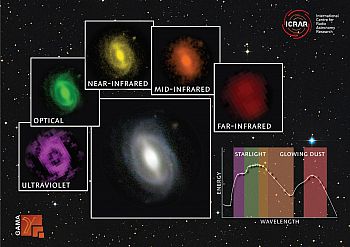Astronomers at Sussex measure how fast our universe is dying
An international team of researchers, including two Sussex astronomers, have measured the energy generated within a large portion of space and have discovered that the universe is slowly dying.
 Sussex’s Dr Jon Loveday and Dr Stephen Wilkins were part of a team that analysed wavelengths ranging from ultraviolet to infrared, finding that the universe's energy output is slowly fading.
Sussex’s Dr Jon Loveday and Dr Stephen Wilkins were part of a team that analysed wavelengths ranging from ultraviolet to infrared, finding that the universe's energy output is slowly fading.
Sussex’s Dr Jon Loveday and Dr Stephen Wilkins were part of a team that analysed the light from 200,000 galaxies in 21 wavelengths and found that the energy output of the universe has nearly halved in two billion years.
This drop in energy is down to the falling rate at which new stars are created.
Dr Wilkins explains: “We know that star formation peaked a few billion years ago and has been declining since. This is just a new way of measuring that decline.
“The rate at which stars form is probably going to decline more and more, so the universe will, based on our expectations, become fainter. However there's a huge amount of uncertainty there because we don't fully understand the underlying cosmology.”
The research is part of the Galaxy and Mass Assembly (GAMA) survey, the largest multi-wavelength survey ever put together.
As part of the project, Dr Loveday spent many nights at the Anglo-Australian Telescope (AAT) in New South Wales, Australia to measure the energy being emitted by distant galaxies.
Fading energy levels have been observed previously, yet this is the first time that researchers have measured energy output across such a large spectrum of wavelengths, from ultraviolent to infrared.
Dr Wilkins says: “It’s a new spin, and it completely agrees with the previous results - but it's tightened the error bars as well.”
While data from the survey has been used to estimate the speed at which the universe is dying, it can also serve other purposes.
Dr Loveday explains: “The GAMA database is mostly designed to address questions about galaxy formation and evolution, but will also help answer cosmological questions such as the nature of dark matter and dark energy.”
There are seven researchers at Sussex working on various projects involving data from the GAMA survey: Professor Seb Oliver, Dr Jon Loveday, Dr Stephen Wilkins, Scott Clay, Antonio Vazquez Mata, Hazel Martindale and Ridwan Barbhuiyan.
